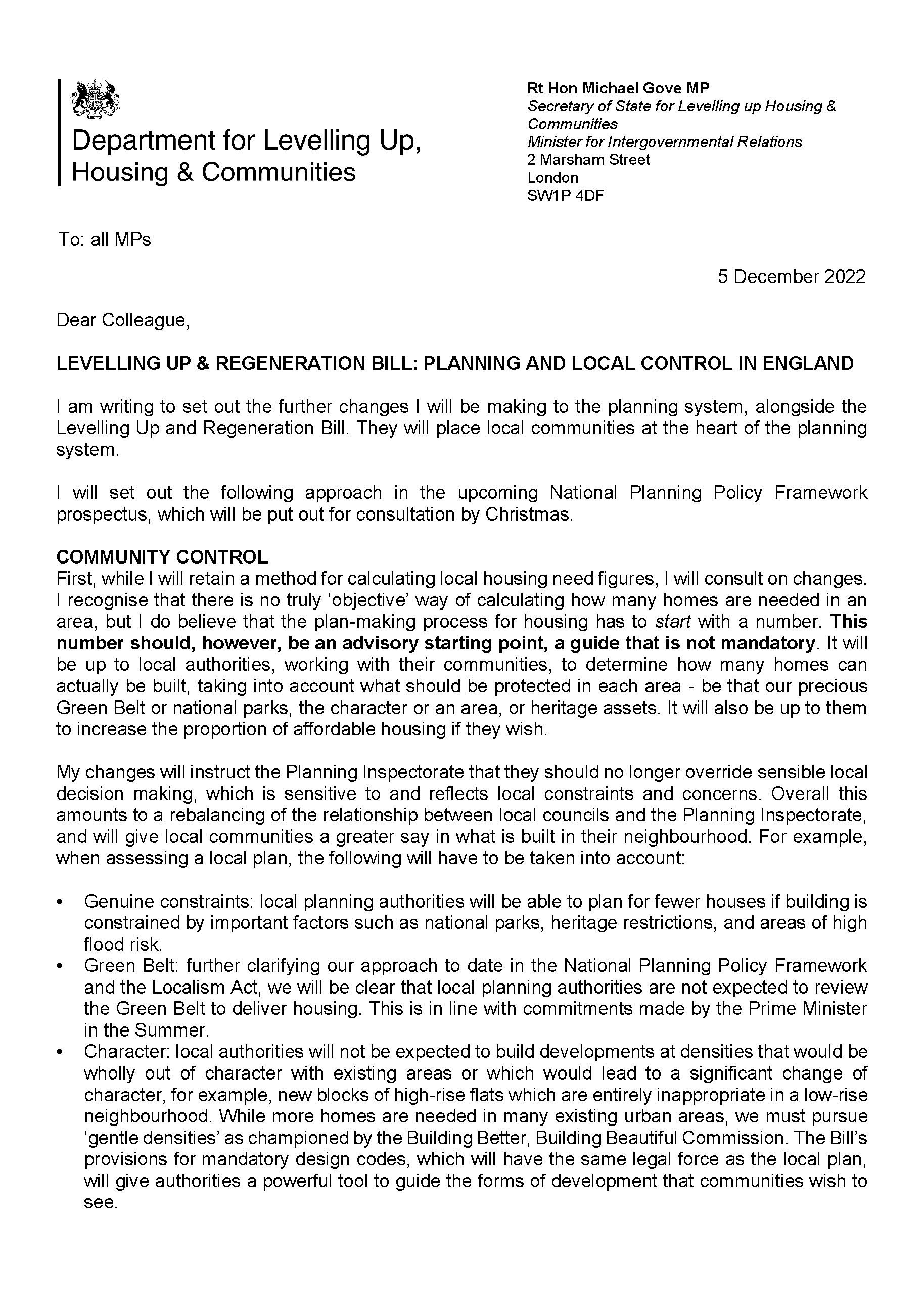January 11, 2023
Dear Colleague, LEVELLING UP ®GENERATION BILL: PLANNING AND LOCAL CONTROL IN ENGLAND I am writing to set out the further changes I will be making to the planning system, alongside the Levelling Up and Regeneration Bill. They will place local communities at the heart of the planning system. I will set out the following approach in the upcoming National Planning Policy Framework prospectus, which will be put out for consultation by Christmas. COMMUNITY CONTROL First, while I will retain a method for calculating local housing need figures, I will consult on changes. I recognise that there is no truly ‘objective’ way of calculating how many homes are needed in an area, but I do believe that the plan-making process for housing has to start with a number. This number should, however, be an advisory starting point, a guide that is not mandatory. It will be up to local authorities, working with their communities, to determine how many homes can actually be built, taking into account what should be protected in each area - be that our precious Green Belt or national parks, the character or an area, or heritage assets. It will also be up to them to increase the proportion of affordable housing if they wish. My changes will instruct the Planning Inspectorate that they should no longer override sensible local decision making, which is sensitive to and reflects local constraints and concerns. Overall this amounts to a rebalancing of the relationship between local councils and the Planning Inspectorate, and will give local communities a greater say in what is built in their neighbourhood. For example, when assessing a local plan, the following will have to be taken into account: • Genuine constraints: local planning authorities will be able to plan for fewer houses if building is constrained by important factors such as national parks, heritage restrictions, and areas of high flood risk. • Green Belt: further clarifying our approach to date in the National Planning Policy Framework and the Localism Act, we will be clear that local planning authorities are not expected to review the Green Belt to deliver housing. This is in line with commitments made by the Prime Minister in the Summer. • Character: local authorities will not be expected to build developments at densities that would be wholly out of character with existing areas or which would lead to a significant change of character, for example, new blocks of high-rise flats which are entirely inappropriate in a low-rise neighbourhood. While more homes are needed in many existing urban areas, we must pursue ‘gentle densities’ as championed by the Building Better, Building Beautiful Commission. The Bill’s provisions for mandatory design codes, which will have the same legal force as the local plan, will give authorities a powerful tool to guide the forms of development that communities wish to see. We are committed to ensuring that the planning system creates more beautiful and sustainable buildings. Through the Bill we are seeking to introduce a duty for all local councils to produce a design code covering the same area as the local plan, which will set simple clear minimum standards on development in that area – such as height, form and density. This measure will empower communities, working with local councils, to have a say on what their area will look like by setting clear standards for new development. I will announce more details shortly about how the Office for Place – which will be established to champion beautiful, popular and enduring design – will support local authorities and communities in this important work. The input of colleagues in further developing this approach will be most welcome. As the Prime Minister committed in the Summer, I will also review how the ‘soundness’ test for reviewing plans at examination is operated by the Planning Inspectorate. I will ensure that plans no longer have to be ‘justified’, meaning that there will be a lower bar for assessment, and authorities will no longer have to provide disproportionate amounts of evidence to argue their case. The effect of these changes will be to make absolutely clear that Local Housing Need should always be a starting point – but no more than that – and importantly, that areas will not be expected to meet this need where they are subject to genuine constraints. Inspectors will therefore be required to take a more reasonable approach to authorities that have come forward with plans that take account of the concerns of the local community, by taking a more pragmatic approach at examination which fully reflects this updated policy. For those areas that would like to bring forward their own method for assessing housing needs, I will be clear on the exceptional circumstances under which they may do so, for example where a case can be made for unusual demographic and geographic factors. This will be made clear in an updated National Planning Policy Framework and guidance to the Planning Inspector. LOCAL PLANS I want to change the system on the rolling five-year land supply. We will end the obligation on local authorities to maintain a rolling five-year supply of land for housing where their plans are up-to-date. Therefore for authorities with a local plan, or where authorities are benefitting from transitional arrangements, the presumption in favour of sustainable development and the ‘tilted balance’ will typically not apply in relation to issues affecting land supply. I also want to consult on dropping the requirement for a 20% buffer to be added for both plan making and decision making – which otherwise effectively means that local authorities need to identify six years of supply rather than five. In addition, I want to recognise that some areas have historically overdelivered on housing - but they are not rewarded for this. My plan will therefore allow local planning authorities to take this into account when preparing a new local plan, lowering the number of houses they need to plan for. Places with existing plans will benefit from the changes above, as they will be free of five-year land supply obligations provided that plan is up to date. However, I am aware that those with local plans at an advanced stage of preparation will not benefit from these changes so I will also put in place transitional arrangements. Where authorities are well-advanced in producing a new plan, but the constraints which I have outlined mean that the amount of land to be released needs to be reassessed, I will give those places a two year period to revise their plan against the changes we propose and to get it adopted. And while they are doing this, we will also make sure that these places are less at risk from speculative development, by reducing the amount of land which they need to show is available on a rolling basis (from the current five years to four). Communities will therefore have a much more powerful incentive to get involved in drawing up local plans. Only four-in-ten local authorities have up to date local plans and I am determined to change this. They can protect the important landscapes they cherish, direct homes to the places they want, and adopt design codes to secure the houses they want to see. Once a plan is in place, these changes mean that they will no longer be exposed to speculative developments on which they have less of a say. I will increase community protections afforded by a neighbourhood plan against developer appeals – increasing those protections from two years to five years. The power of local and neighbourhood plans will be enhanced by the Bill; and this will be underpinned further through this commitment. Adopting a plan will be the best form of community action - and protection. Furthermore, we will clarify and consult on what areas we propose to be in scope of the new National Development Management Policies, and we will consult on each new Policy before it is brought forward by the Government. National Development Management Policies will also not constrain the ability of local areas to set policies on specific local issues. To support the delivery of these, and other planning changes, we must ensure that planning departments are properly resourced through a national fee increase. We have announced our intention to increase fees, including doubling fees for retrospective application where breaches of planning have occurred, and we intend to consult on the detailed proposals for such increases in planning fees as soon as possible. In addition to increasing fees we intend to also consult on a new planning performance framework that will monitor local performance across a broader set of measures of planning service delivery, including planning enforcement. BUILD OUT We need to hold developers to account so that desperately needed new homes are built, and I already have a significant package of measures in the Bill to do this, including public reporting and declining new planning applications on a site if developers are failing to build out. I will consult on two further measures: i) on allowing local planning authorities to refuse planning applications from developers who have built slowly in the past; and ii) on making sure that local authorities who permission land are not punished under the housing delivery test when it is developers who are not building. To make sure we are doing all we can to address this important issue, I will also consult on a new approach to accelerating the speed at which permissions are built out, specifically on a new financial penalty. In the summer, the Prime Minister correctly highlighted the importance of tackling this issue. I believe this new package will do so. CHARACTER OF A DEVELOPER I have heard and seen examples of how the planning system is undermined by irresponsible developers and landowners who persistently ignore planning rules and fail to deliver their legal commitments to the community. That is wrong, and to make it worse, this behaviour is then ignored if they seek planning permission again. I therefore propose to consult on the best way of addressing this issue, including looking at a similar approach to tackling the slow build out of permissions, where we will give local authorities the power to stop developers getting permissions. BROWNFIELD FIRST The Government is investing to incentivise and enable brownfield development. Homes England, our housing delivery arm, is spending millions on acquiring sites in urban areas to regenerate for new housing. We are also allocating over £800m to mayoral and local authorities to unlock over 60,000 new homes on brownfield land, as part of our wider brownfield and infrastructure funding package. We have already tilted the playing field in favour of brownfield and cities through our urban uplift and scrapped the 80/20 funding rule that focused investment in Greater London. This means we are instead investing more homes in the North and Midlands to relieve pressure on the South East. 4 We know urban regeneration is working. City centres that were depopulating in the 1990s are now seeing their populations rise. Manchester city centre, for example, has transformed with new homes and commercial spaces. We will continue to seek further development in towns and cities through our permitted development rights, which allow change from commercial to residential use. This route has provided over 82,000 housing units in the last six years. But I know we need to do more, and we will do that. The new Infrastructure Levy will be set locally by local planning authorities. They will be able to set different Levy rates in different areas, for example lower rates on brownfield over greenfield to increase the potential for brownfield development. That will allow them to reflect national policy, which delivers our brownfield first pledge by giving substantial weight to the value of using brownfield land. As the Prime Minister committed to in the summer, we will also continue to get cities building more new houses, and stop them offloading their responsibilities to provide new housing onto neighbouring green fields by ending the so-called ‘duty to co-operate' which has made it easier for urban authorities to impose their housing on suburban and rural communities. The Bill also enables gentle densification through Street Votes and design codes, allowing communities to consent to add storeys to existing dwellings with the increase in value going to local people. I will consult to see what more we can do in national policy to support development on small sites particularly with respect to affordable housing and I will launch a review into identifying further measures that would prioritise the use of brownfield land. To help make the most of empty premises including those above shops, I am reducing the period after which a council tax premium can be charged so that we can make the most of the space we already have. I will also provide further protection in national policy for our important agricultural land used for food production, making it harder for developers to build on it. THE HOUSING MARKET Housing plays a key role in the lives of all our constituents and buying a home is one of the most important decisions a family takes – but too many new homes are bought by overseas investors speculating on the housing market, who leave them empty or flip them to holiday rentals. The Bill takes steps to address that, with council tax measures on empty homes, and we already have additional stamp duty rates on non-resident buyers. Specifically, I intend to table an amendment at Commons Report to enable a registration scheme for short term lets in England, which would be discretionary for local authorities. The details of how the scheme would be administered will be consulted on before summer recess, with a view to the scheme being up and running as soon as possible thereafter. I will also consult on going further still and reviewing the Use Classes Order so that it enables places such as Devon, Cornwall, and the Lake District to better control changes of use to short term lets if they wish. I have asked the Competition and Markets Authority to consider undertaking a market study. I believe the case is clear for them to take this forward, but respect their independence as they come to a decision. No planning reforms will ever be perfect, but I judge that the Bill, alongside the broader policy changes that I am proposing above, will leave us with a significantly improved planning system than the status quo. These reforms will help to deliver enough of the right homes in the right places and will do that by promoting development that is beautiful, that comes with the right infrastructure, that is done democratically with local communities rather than to them, that protects and improves our environment, and that leaves us with better neighbourhoods than before. A Written Ministerial Statement regarding all of these changes will be made in Parliament tomorrow. Rt Hon Michael Gove MP Secretary of State for Levelling Up, Housing & Communities Minister for Intergovernmental Relations








